The Anti-Suffrage Anomaly:
GERTRUDE BELL
AND THE QUESTION
OF PRIVILEGE
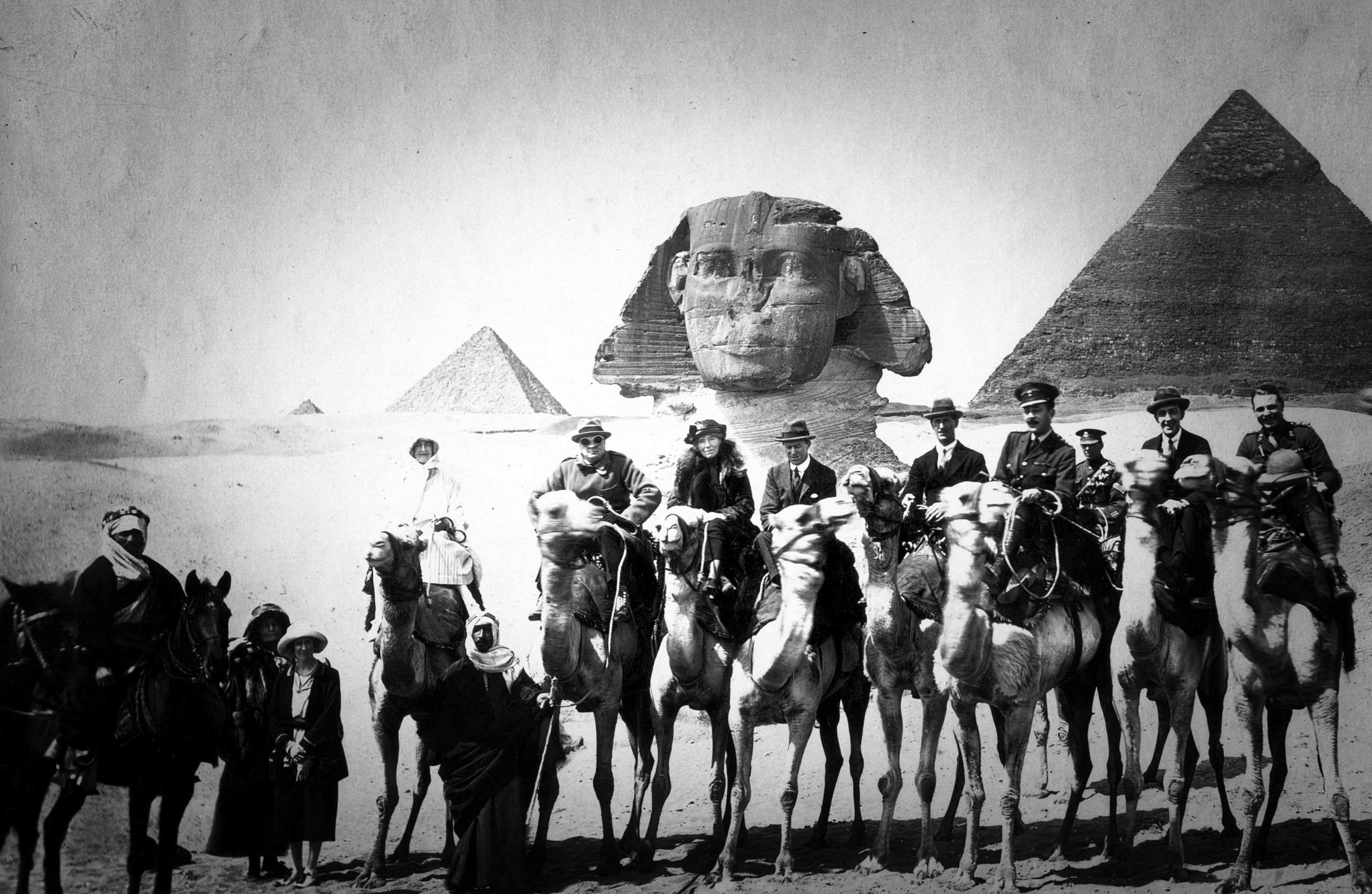
In 1917, the influential British archaeologist and explorer, Gertrude Bell was appointed Commander of the British Empire (CBE). Despite Bell's involvement in politics making her one of the first British women to hold official governmental office, she actively participated in the anti-suffrage campaign against the female vote.
As a white, upper-middle class Imperialist, sex did not act as a barrier for Bell. The personal privilege that she possessed separated her from the typical limitations encountered by women.
Explore how privilege can defy the restrictions of gendered society...
"Her upbringing instilled in her a sense that to share in the concerns of the government was her birthright."
Helen Berry, 'Gertrude Bell and Iraq: A Life and Legacy'
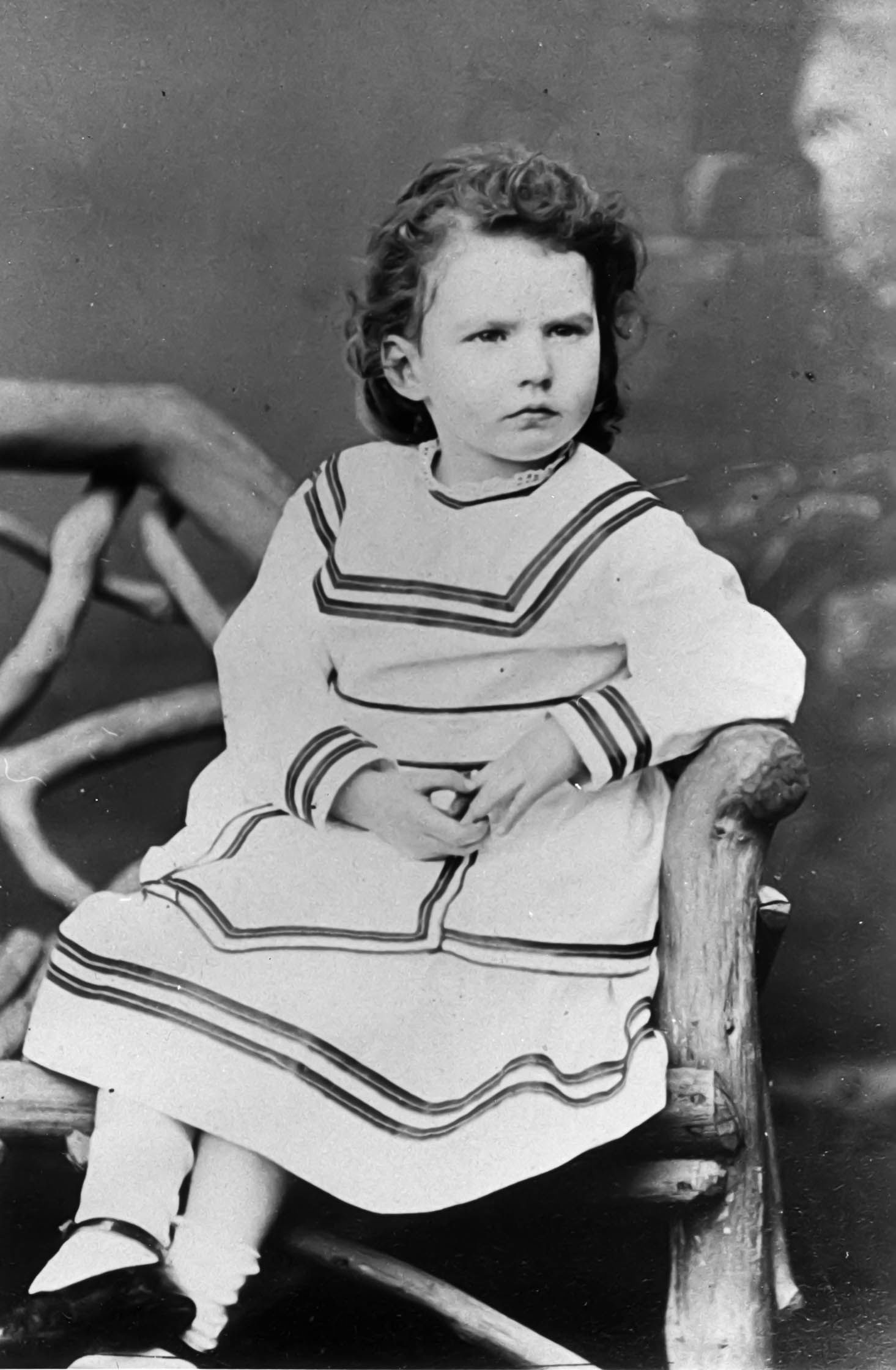
EARLY LIFE
Gertrude Bell was born on 14th July 1868 at her family home, Washington New Hall. The Hall was built by her grandfather Sir Isaac Lowthian Bell, 1st Baronet. Sir Isaac was a skilful ironmaster and entrepreneur, who in the mid-nineteenth century owned and operated one of the largest ironworks in the North East of England. In 1875 he became a Liberal Member of Parliament.
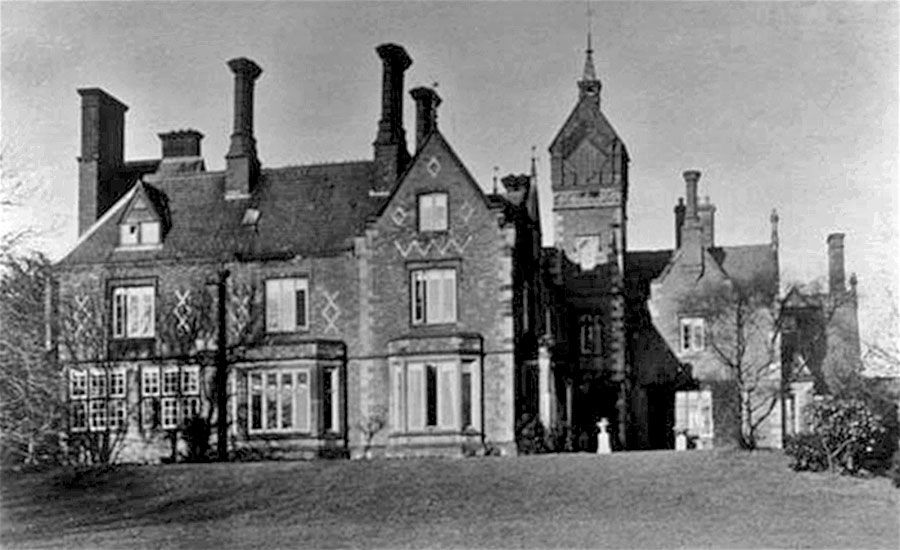
Washington New Hall, County Durham, England. Date unknown.
Washington New Hall, County Durham, England. Date unknown.
Bell's father was the patrician industrialist Sir Thomas Hugh Bell, 2nd Baronet, husband of Bell's mother, Mary Shield. During Bell's lifetime, her father served as High Sheriff of Durham and Mayor of Middlesborough. The family's involvement in Northumberland's lucrative industrial growth provided Bell with a comfortable upbringing. She was a gifted child who enjoyed challenging herself with the intellectual and athletic activities available to the upper-middle classes.
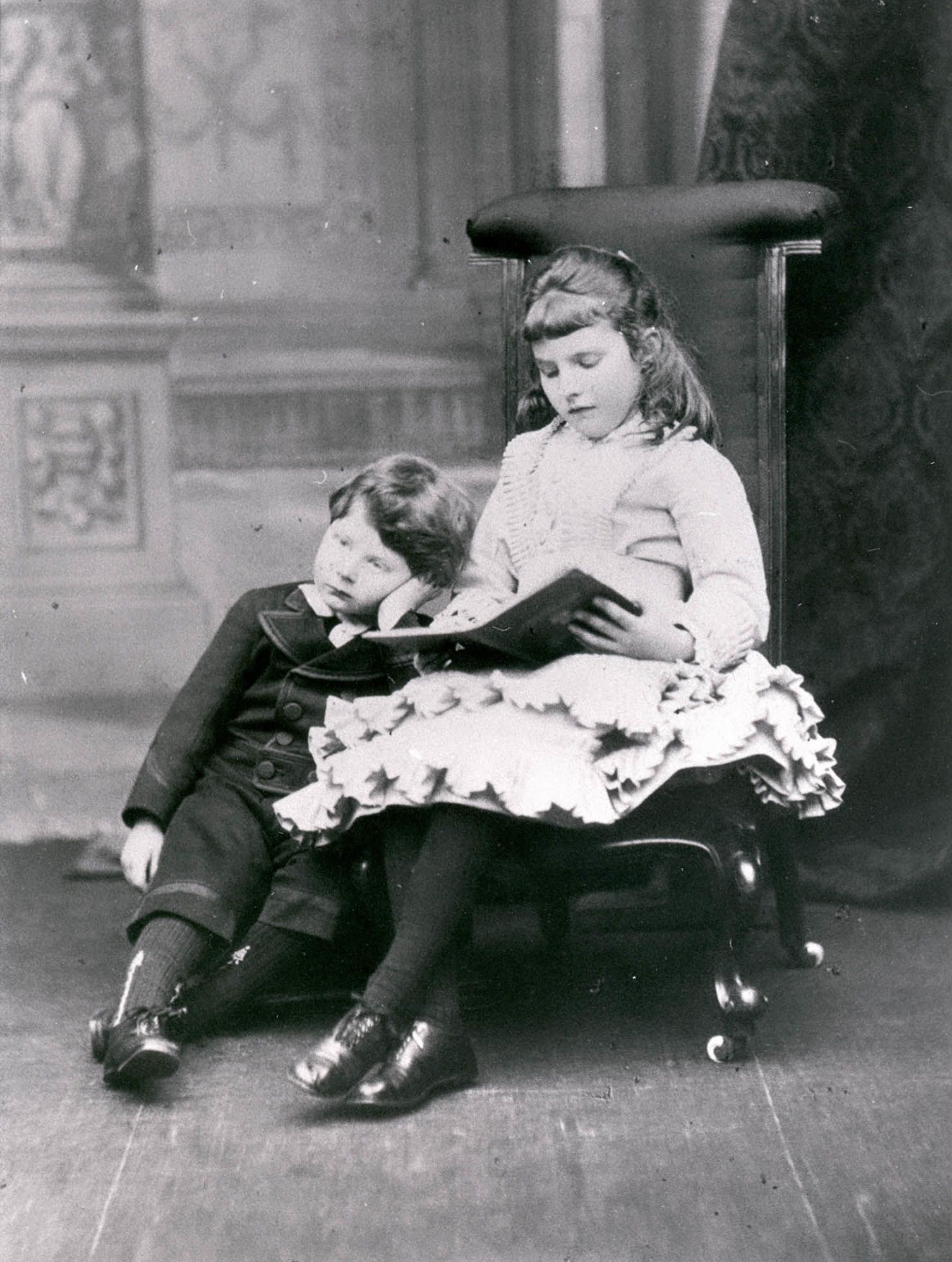
Photograph of Gertrude Bell aged 7 with younger brother Maurice, 1875 (PERSA_002, Bell (Gertrude) Collection, Newcastle University Special Collections)
Photograph of Gertrude Bell aged 7 with younger brother Maurice, 1875 (PERSA_002, Bell (Gertrude) Collection, Newcastle University Special Collections)
Due to complications during childbirth, Bell's mother died in 1871 whilst giving birth to son Maurice. The absence of a maternal figure in Bell's developmental years drove her independent nature. In 1876, Sir Hugh married Florence Olliffe. Dame Florence recognised the importance of women's education and supported any venture that Bell pursued, treating her as though she were her own daughter. Bell formed a lifelong bond with her stepmother, always beginning her letters to Dame Florence with "Dearest Mother."

"I must tell you an absurd story. Minnie Hope was sitting with an Oxford man. Presently he grasped her hand and said "do [you] see that young lady in a blue jacket." "Yes said Minnie, lying low. "Well" said he in an awestruck voice "she took a first in History!!"
Bell's letter to her stepmother Dame Florence Bell, 3rd July1889
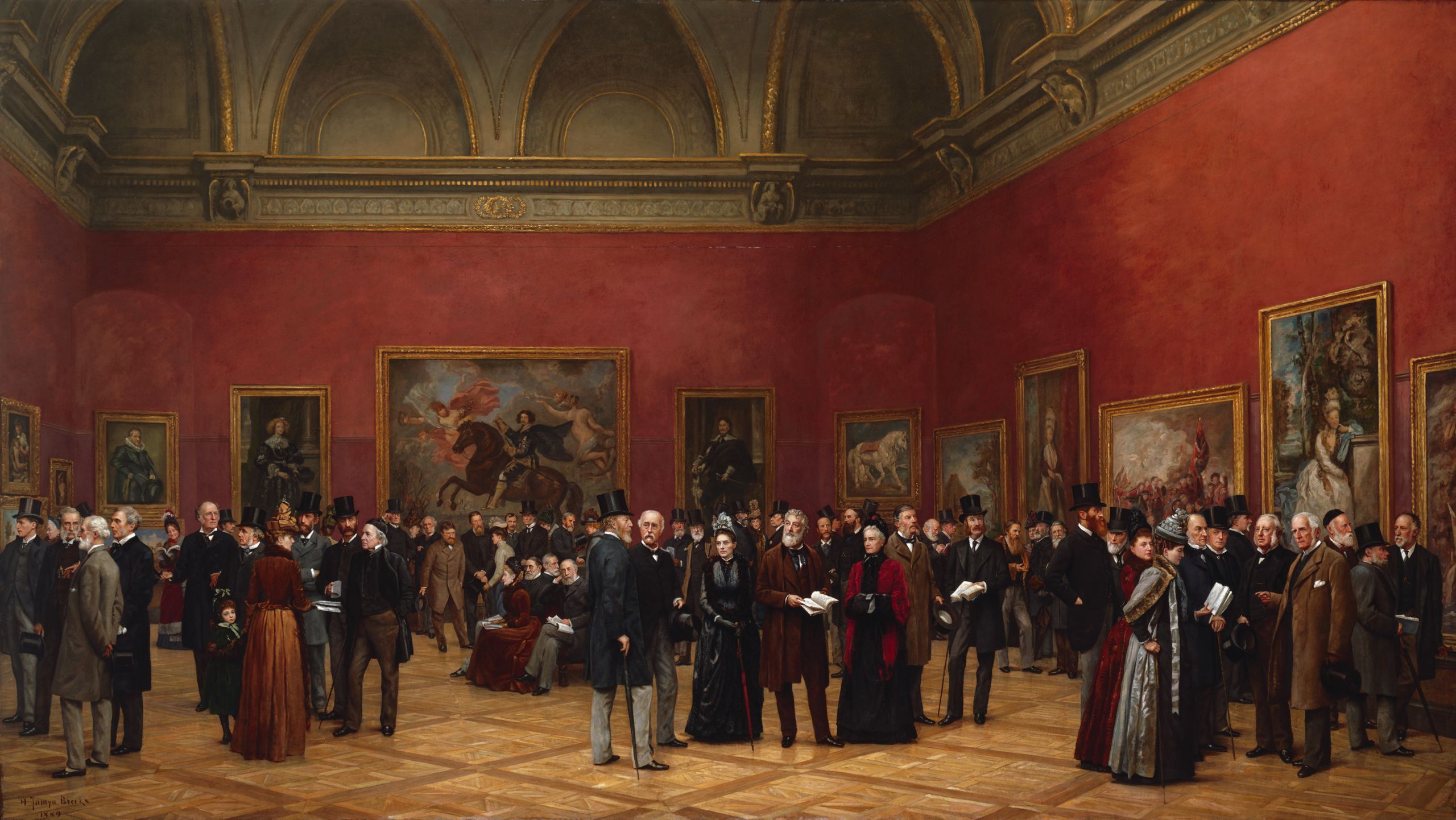
EDUCATION
Gertrude Bell's family of industrial pioneers did not just give her status, but money and support too. They encouraged her academic interests by giving her access to an elite formal education at Queen's College, London which educated girls between the ages 12-20. The school was founded in 1848 and Bell attended in 1884. Queen's College was met with controversy for being the first institution in the world to award academic qualifications to women, acknowledging female and male academia to be equal. Bell experienced an environment outside of the domestic sphere that truly valued her intelligence; few women had this luxury yet.
After excelling at Queen's College, Bell sought to further her education. In 1886 she moved to Oxford University to study History at Lady Margaret Hall. She gained a first class honours in just 2 years, but was not officially awarded with a degree qualification. Women were not eligible to officially matriculate or graduate until 1920. The limited number of female students that attended Oxford University in the 1880s faced restrictions that their male counterparts did not.
When Lady Margaret Hall opened in 1879, it was one of only two women's colleges. Between Lady Margaret Hall and Somerville College there were only 21 female students studying in total. The number did not increase significantly before Bell became a student herself.

Title cropped from Inter-Collegiate Rules for Women Undergraduates, c.1910. By kind permission of the Principal and Fellows of Lady Margaret Hall, Oxford.
Title cropped from Inter-Collegiate Rules for Women Undergraduates, c.1910. By kind permission of the Principal and Fellows of Lady Margaret Hall, Oxford.
At Lady Margaret Hall, female students were required to adhere to the 'Inter-Collegiate Rules for Women Undergraduates'. The rules were written by the college to restrict social interaction between male and female students. One rule states that "conversation between men and women undergraduates before and after lectures is not encouraged" (2). Restrictions were also applied to the classroom. Male students took lectures in purpose built teaching rooms, whilst women were kept separate in a small classroom above a bakery.
Despite the rules, and subsequently the hostility from male students, Bell completed her studies a year early. She carried the resilience necessary to thrive in male-centric settings for the entirety of her life.
There is a significant gap in Bell's diary from the period of time in which she attended Oxford University. Her appreciation of the education available to her meant that she spent little time doing anything but studying. There are only two existing letters from that time and their content focuses on visits from family, and formal dinners and lunches. Although Bell rarely spent time away from studying, when she did it was with the intention to network.
Even with the Inter-Collegiate Rules trying to sustain a gendered division, Bell did not shy away from male company. It gave her an abundance of self-confidence to draw on in later endeavours when moving in the masculine environments of the British Empire.

Rule 1 cropped from the Inter-Collegiate Rules for Women Undergraduates, c.1910. By kind permission of the Principal and Fellows of Lady Margaret Hall, Oxford.
Rule 1 cropped from the Inter-Collegiate Rules for Women Undergraduates, c.1910. By kind permission of the Principal and Fellows of Lady Margaret Hall, Oxford.
Rule 1 restricted a female undergraduate's residence "out of Full Term". However, this implies that women were allowed to freely reside in Oxford during term time. The privilege of having a family that believed in women's education meant that Bell was permitted to reside 200 miles away from the family home in County Durham. Residential freedom during term time gave Bell access to a kind of independence that a young girl could not get at home.

Rule 8 cropped from the Inter-Collegiate Rules for Women Undergraduates, c.1910. By kind permission of the Principal and Fellows of Lady Margaret Hall, Oxford.
Rule 8 cropped from the Inter-Collegiate Rules for Women Undergraduates, c.1910. By kind permission of the Principal and Fellows of Lady Margaret Hall, Oxford.
Rule 8 displays the restrictions held over Societies with both male and female members. They required women to ask for permission before engaging in mixed-sex social activity, and in some cases insisted that a chaperone be present. Regardless of the restriction, Bell had the courage to find her way around the limited interaction with men.
"I lunched with him in Horace's rooms on Sunday" Bell's letter to Dame Florence, 22nd February 1888
Bell met with her male friends in their rooms, despite the University's best efforts to prevent such activity. Bell's interest in politics and power gave her the agency to move in erudite male spaces where these topics were usually discussed.
After her time at Lady Margaret Hall, Bell begun a dynamic three years travelling between London and her family's new home in Coatham, Redcar. When staying in the North East, she tutored her younger siblings and carried out philanthropic work among the men who were employed at her family's ironworks. During the summer social season in London, she stayed with her stepmother's family at 95 Sloane Street in the Royal Borough of Kensington and Chelsea. In 2019, English Heritage honoured this period of Bell's life by erecting a blue plaque outside the property.
Bell welcomed visitors from a whole array of fields - political, academic, and the arts, - and attended many private events for the upper classes. She hosted Mandell Creighton, Bishop of the Church of England; Bertrand Russell, mathematician and philosopher; Johnston Forbes-Robertson, a renowned actor and stage manager. Bell's diary entry from 16th February 1890 mentions "Mrs Ward". She is likely to be referring to Mary Augusta Ward who went on to chair the Women's National Anti-Suffrage League. Other diary entries from February 1890 mention a "Flora", who is likely to be Flora Shaw, also known as Lady Lugard, an Imperial celebrity who is said to have named 'Nigeria'.
While living in the social hub of England, Bell was able to insert herself into networks of privilege that shaped her adult life.
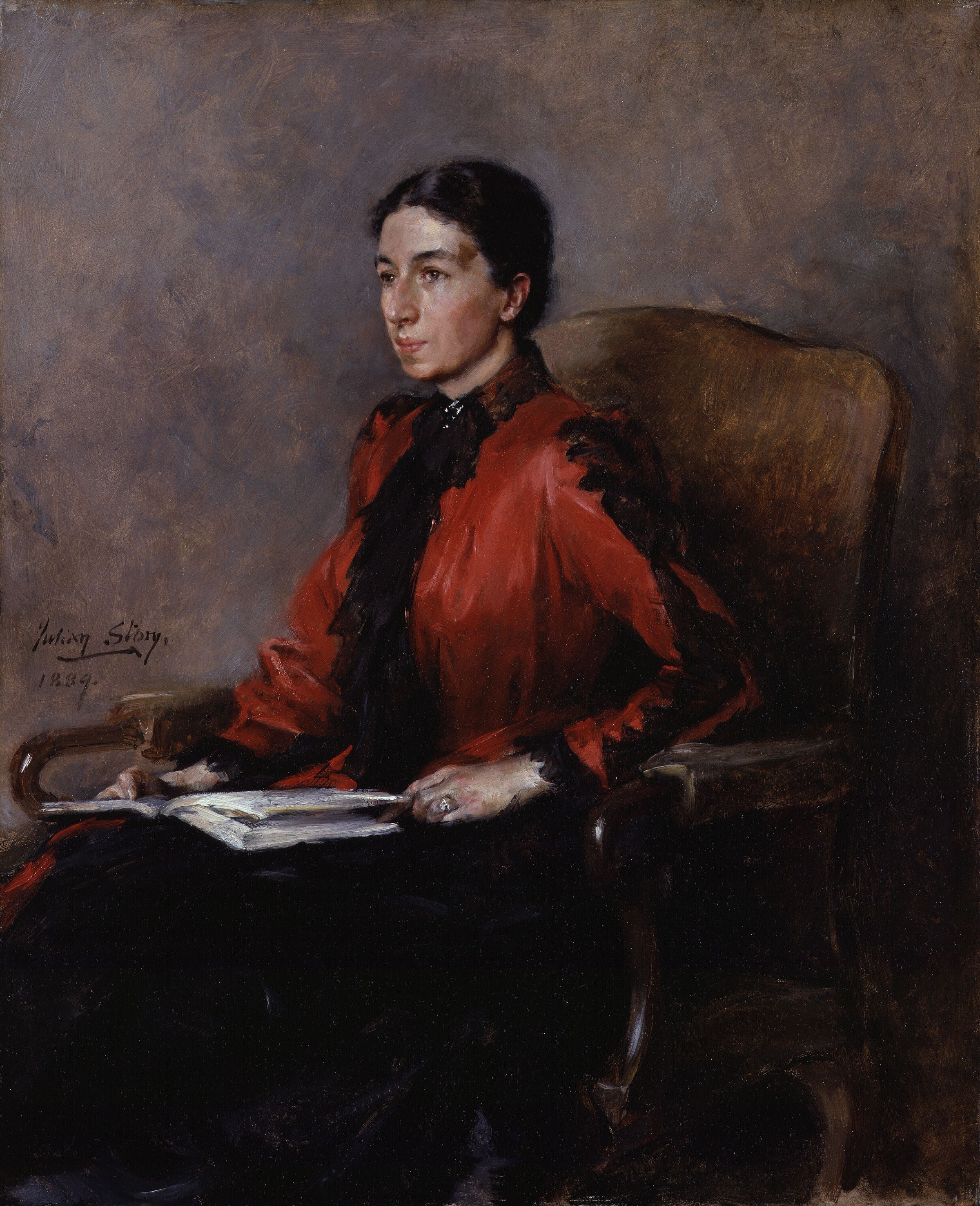
Oil painting of Mary Ward by Julian Russell Story, 1889. National Portrait Gallery.
Oil painting of Mary Ward by Julian Russell Story, 1889. National Portrait Gallery.
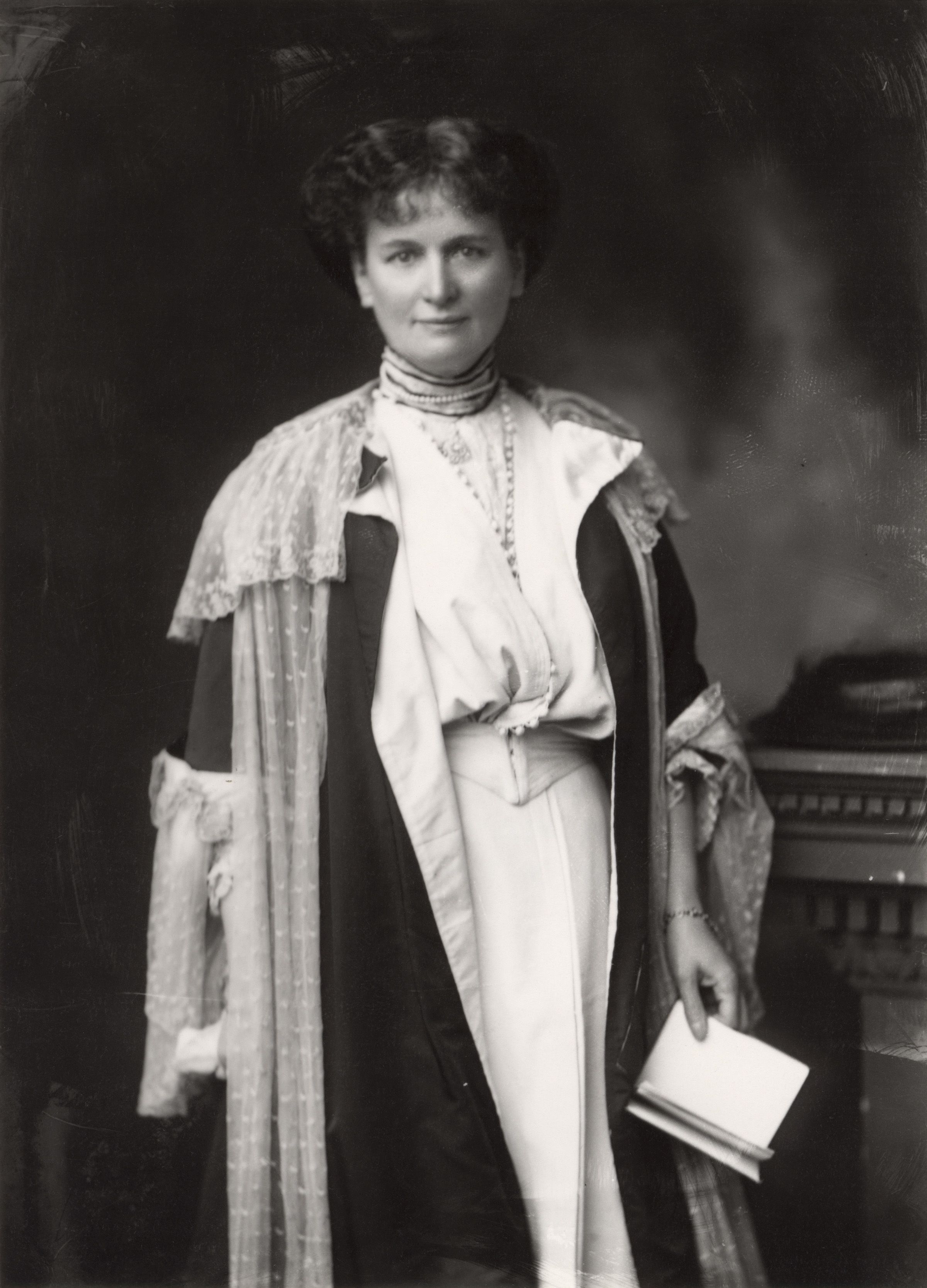
Photograph of Flora Shaw taken by George Charles Beresford, 1908. National Portrait Gallery.
Photograph of Flora Shaw taken by George Charles Beresford, 1908. National Portrait Gallery.
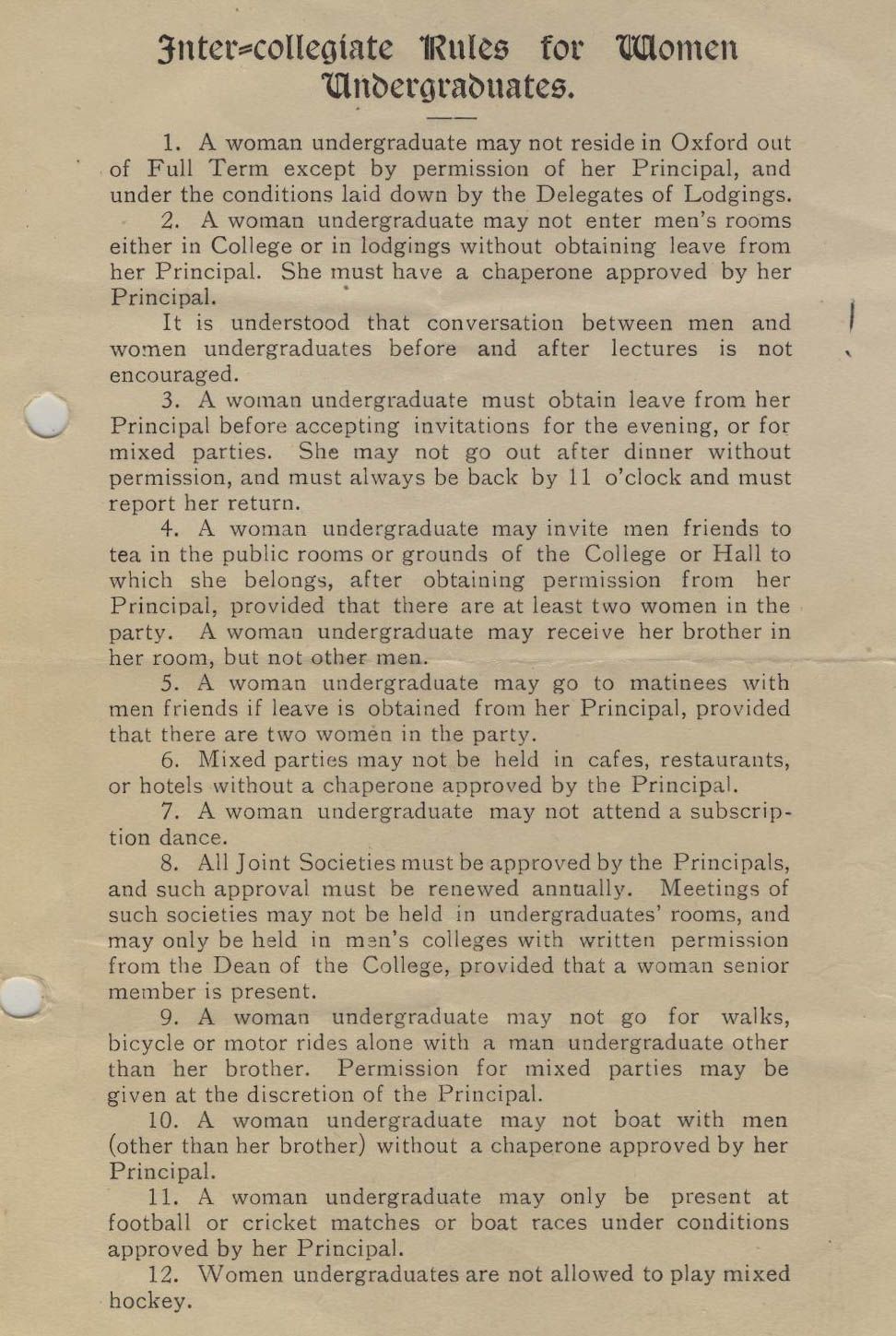
"Worked again all day and finished at nightfall. Not at all tired. Sat with the men at night and 'Ali camel driver told tales of Jinn."
Bell's Diary, 5th January 1914
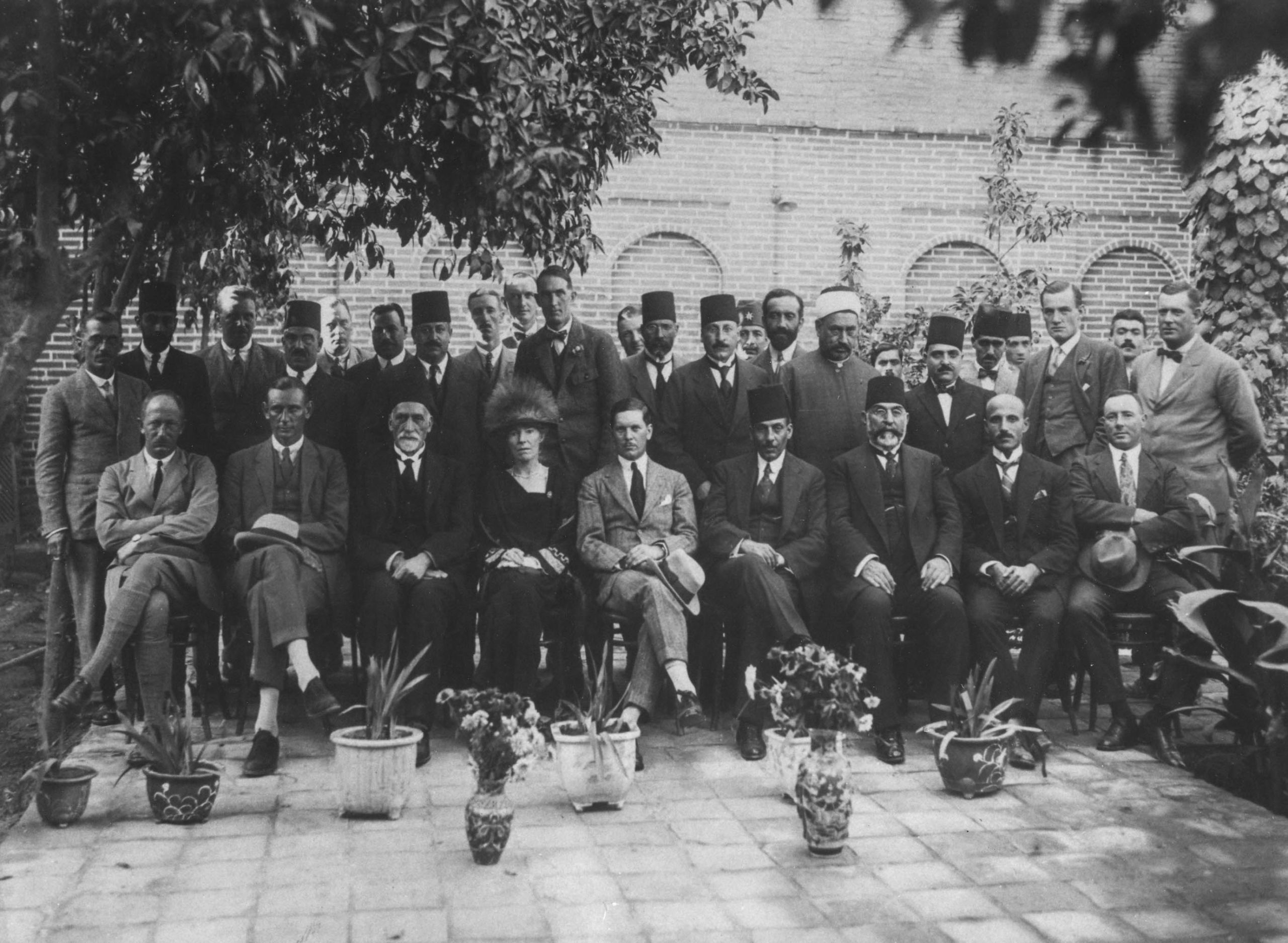
IMPERIALISM
After she completed her studies in 1888, Gertrude Bell was invited to join her stepmother's family on a trip to Bucharest and Constantinople (now known as Istanbul). Dame Florence's brother-in-law, British diplomat Sir Frank Lascelles, was amongst them. He introduced Bell to Charles Hardinge, 1st Baron Hardinge of Penshurst who served as the Governor-General and Viceroy of India from 1910-1916. He would later lead her towards her successful Middle Eastern diplomacy. This tour marked the beginning of a life of travel, archaeological exploration and foreign political engagement.
"We went on to Chillon which is a bewitching place with grey walls rising straight out of the water and pointed turrets." Bell's letter to Dame Florence, 30th April 1893
Intrigued by foreign landscapes, Bell explored the Thuringian Forest near Weimar whilst travelling through Germany, viewed Mount Fuji from a Shinto Shrine in Tokyo, and discovered ten new ascents and routes in the Bernese Oberland on a visit to Switzerland in 1901. Bell developed a particular interest however for Mesopotamia and Arabia, which is where she would spend the majority of her adult life.
"I exchanged confidences with my horse about the weather - in Japanese!" Bell's letter to Dame Florence, 8th March 1898
Always seeking out new knowledge, she even learnt Persian before her brief visit to Persia in 1889.
"Streaming with rain and too cold to swim. I did some Persian in the morning." Bell's diary, 15.8.1895
Whilst travelling and working in the Middle East, Bell produced an extensive collection of photographs and diary entries. She rarely put herself in front of the camera: the people and landscape of the British Empire were the primary subject. The authority that she bestowed upon herself to document and display other cultures is communicated by the sheer volume of material that she produced.
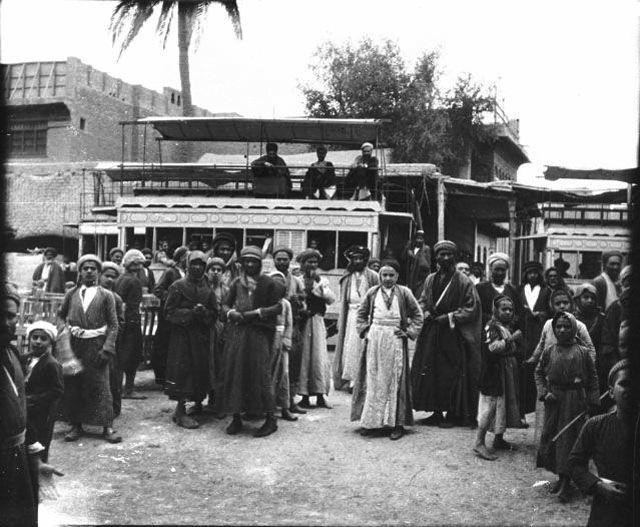
Townspeople in front of a tram in Baghdad, Iraq, 1909. (L_034, Bell (Gertrude) Collection, Newcastle University Special Collections)
Townspeople in front of a tram in Baghdad, Iraq, 1909. (L_034, Bell (Gertrude) Collection, Newcastle University Special Collections)
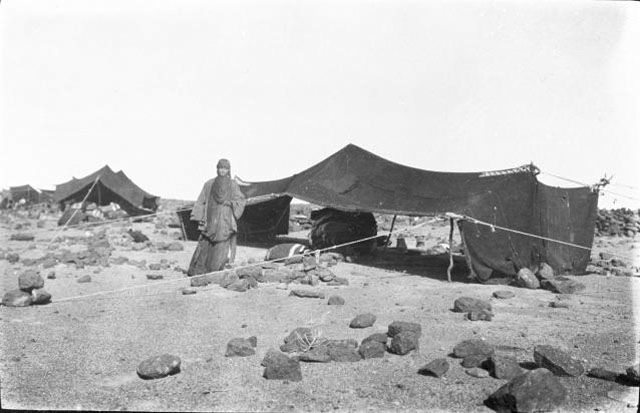
Serdiyyeh woman outside a tent at encampment, The Hamad - Jordan / Saudia Arabia, 1913. (X_006, Bell (Gertrude) Collection, Newcastle University Special Collections)
Serdiyyeh woman outside a tent at encampment, The Hamad - Jordan / Saudia Arabia, 1913. (X_006, Bell (Gertrude) Collection, Newcastle University Special Collections)
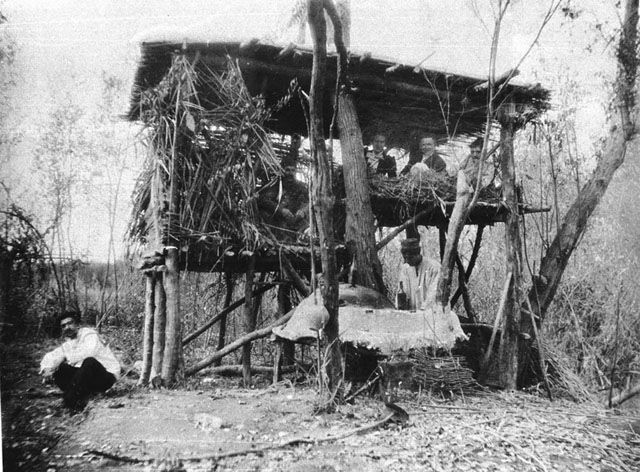
Villagers and Europeans sat in an elevated hut, Lebanon, 1900. (A_558, Bell (Gertrude) Collection, Newcastle University Special Collections)
Villagers and Europeans sat in an elevated hut, Lebanon, 1900. (A_558, Bell (Gertrude) Collection, Newcastle University Special Collections)
Bell photographed her living subjects at great length which provided a pivotal insight into the lives of the British Empire's local peoples. We do however have to question how willing the subjects were.
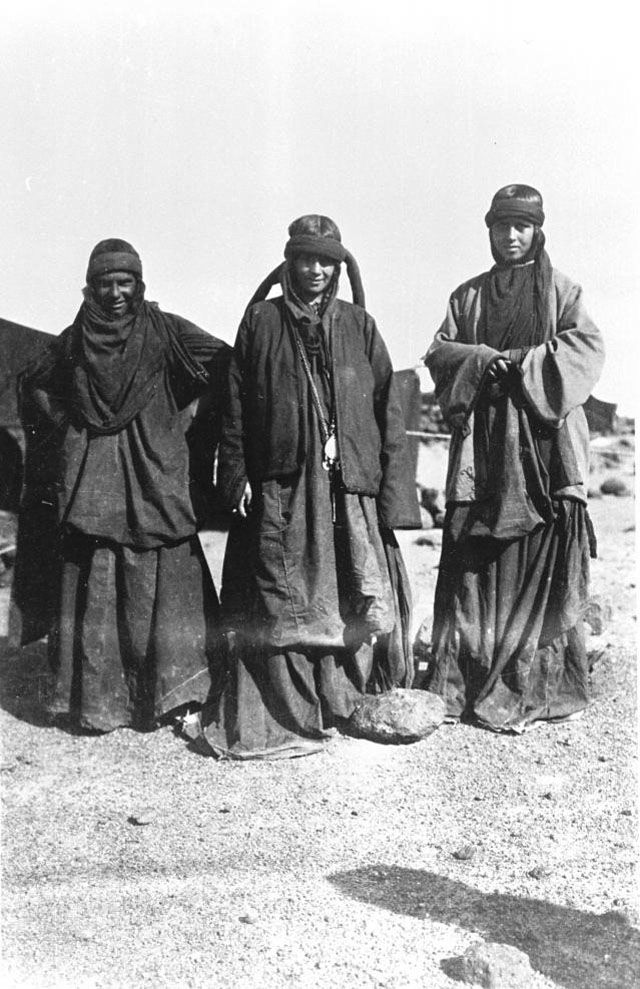
Gertrude Bell's economic and educational privilege facilitated her desire to travel, catapulting her into life as an Imperialist.
Bell's Arabian travel was not for the purpose of exploration like her previous tours, but for diplomacy. In 1913-1914, her trip to the Ha'il region marked her as the first European person to visit in a decade. She was able to provide vital information about the tribes of the area. Lord Hardinge, the Viceroy of India, personally invited Bell to use her knowledge of the region to help the Mesopotamian Expeditionary Force with their Imperial strategy.
D.G. Hogarth, the brother of one of Bell's friend from Oxford University, knew of Bell's familiarity with pre-war Arabia and invited her to the 1921 Cairo Conference. Here she was made Oriental Secretary to Sir Percy Cox and participated in the conference, managing to persuade Winston Churchill to adopt her and Sir Percy's position on the British position in Iraq.
"Well, now I'll tell you about our Conference. I came very reluctantly and am now so very glad I came. It has been wonderful. We covered more work in a fortnight than has ever before been got through in a year. Mr Churchill was admirable" Bell's letter to Lieutenant Colonel Frank Balfour, 25th March 1921
Travel gave Bell the opportunity to pursue her interest in archaeology. Bell's excavations in Iraq were so successful that she established the Museum of Iraq to display her discoveries and was named the Honorary Director of Antiquities. The Museum still exists today.
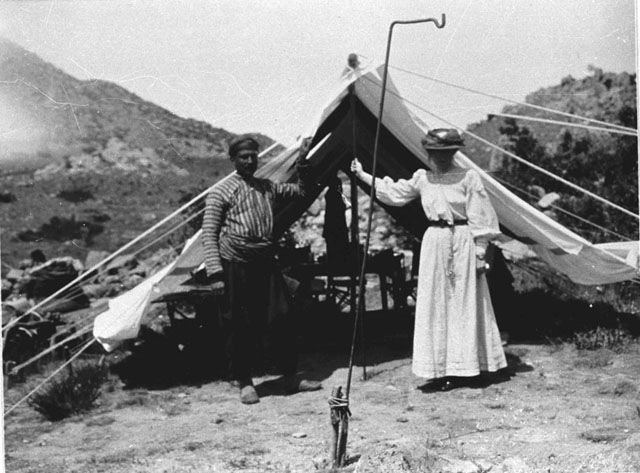
TITLES AND ACHIEVEMENTS
1915: Recruited to work with British Intelligence in Cairo
1916: Given the title Liaison Officer, Correspondent to Cairo (Only female in the British Forces)
1917: Awarded CBE
1917: Given the title Oriental Secretary
1922: Established the Baghdad Archaeological Museum (Now the National Museum of Iraq)
1922: Named Honorary Director of Antiquities for Iraq
The possibility of accessing further knowledge drove Bell's travel across the British Empire, but the privilege of wealth, connections and experience were her ticket into spaces that were typically occupied by men. One can gain an understanding of this by studying her personal diaries.
"We sat in the tent and drank coffee whilst the women loaded the camels" Bell's diary, 19.4.1914
Numerous diary entries show Bell disregarding domestic duties because her intellect was far superior to the women carrying them out. Bell manifested in herself the characteristics demonstrated by male Imperialists, and tended to consort with that side of society where she saw it to be most valuable. She enacted privilege by separating herself from the women of this economy and worked in the empire's public sphere as opposed to the domestically-associated private.
"I wondered whether I should cry out of sheer weariness (...) (Oh Dick, don't let it be known! my reputation as a traveller would never survive these relations)" Bell's diary, 19.4.1914
Gender was not a limiting factor for Bell. She boldly ignored her assigned gender roles to remove factors that could invite oppression. She endeavoured to portray herself as a tenacious, indestrucible traveller and valued the Imperialists who demonstrated similar characteristics. The way she idolised the power and intelligence of these men clearly shaped her attitude and behaviour.
"Photographed Reshid and M. Ali rode with me through the olive gardens to Alani which is Resid's village (...) 3 obsequious people came in who whispered to me in an audible aside that Resid was like a king" Bell's diary, 6.4.1905
The contacts that Bell acquired during her travels in early adulthood would go on to be her teachers, friends and colleagues during her travel across the British Empire. Fredrieich Rosen, the German consul, invited Bell to Jerusalem to work on her Arabic: a skill that became extremely useful to her. The respect that Bell had for that side of society meant that she predominantly favoured men devoted to the Imperial project as subjects for her portrait photography. She rarely photographed women. Instead, she repeatedly captured men in strong poses confronting the lens of the camera, sustaining the notion that they were the more powerful sex. Interestingly, Bell seems to emulate their stances in the few portraits taken of herself.
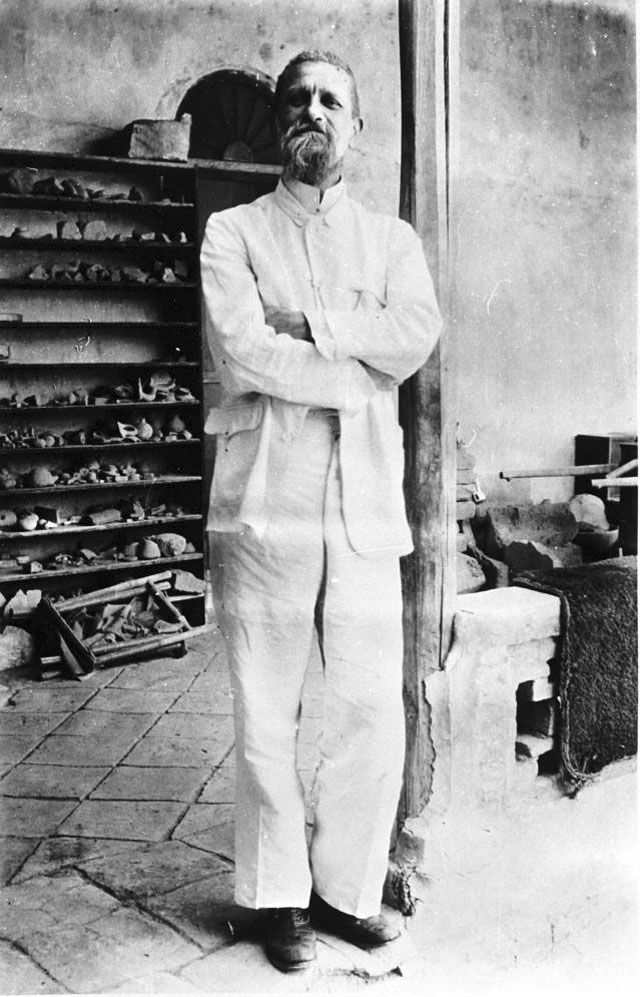
Herr Koldeway, German archaeologist, Babylon, Iraq. 1914. (Y_391, Bell (Gertrude) Archive, Newcastle University Special Collections)
Herr Koldeway, German archaeologist, Babylon, Iraq. 1914. (Y_391, Bell (Gertrude) Archive, Newcastle University Special Collections)
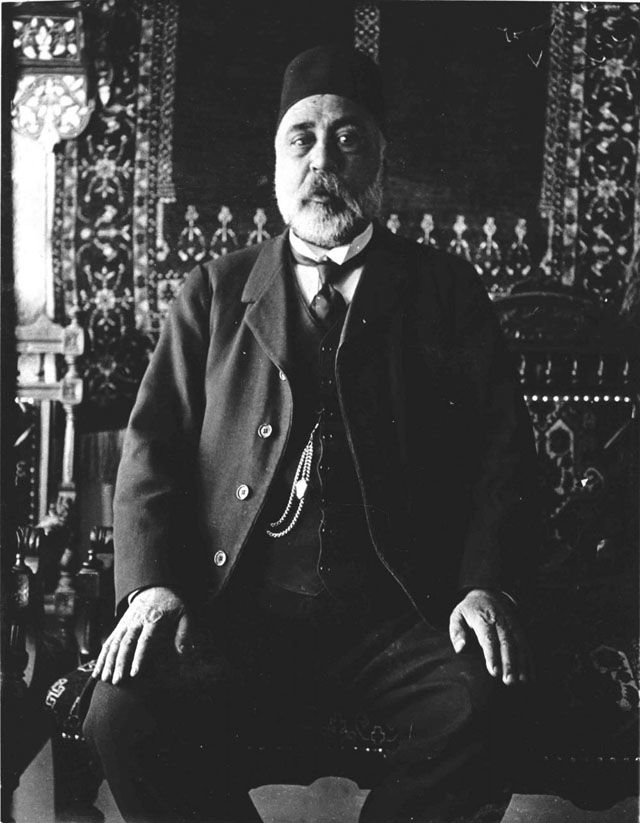
Arab gentleman, Syria. 1905. (B_087, Bell (Gertrude) Archive, Newcastle University Special Collections)
Arab gentleman, Syria. 1905. (B_087, Bell (Gertrude) Archive, Newcastle University Special Collections)
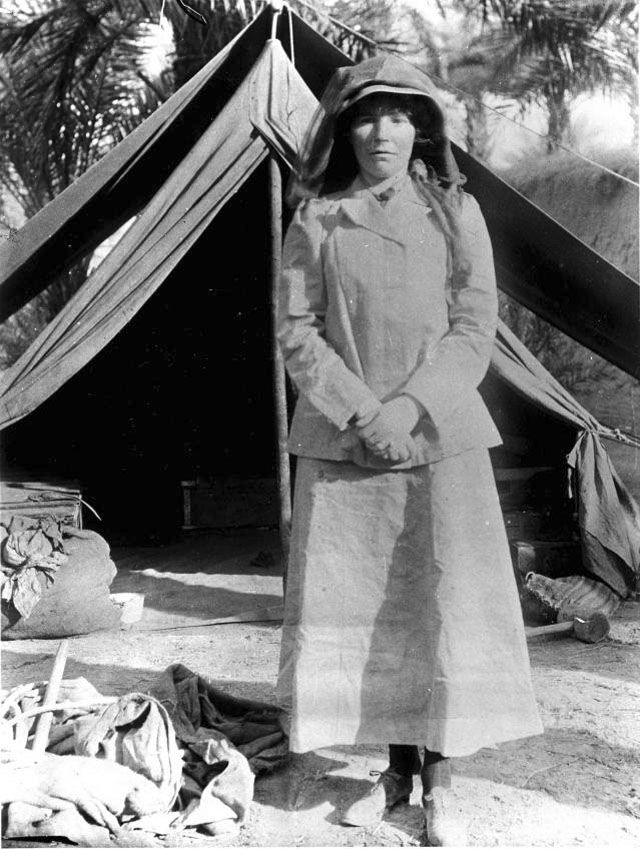
Gertrude Bell aged 41 standing outside her tent, iraq. 1909. (K_218, Bell (Gertrude) Archive, Newcastle University Special Collections)
Gertrude Bell aged 41 standing outside her tent, iraq. 1909. (K_218, Bell (Gertrude) Archive, Newcastle University Special Collections)
TURKIYYEH
Whilst travelling to the Persian border in 1914, Bell encountered a tribe of Circassians. She met with a man from the group named Mustafa Pasha. He had two wives, one of which was named Turkiyyeh. Bell was able to converse with the women in their native language, Arabic, and according to a diary entry Turkiyyah was "a chatterbox of the first order".
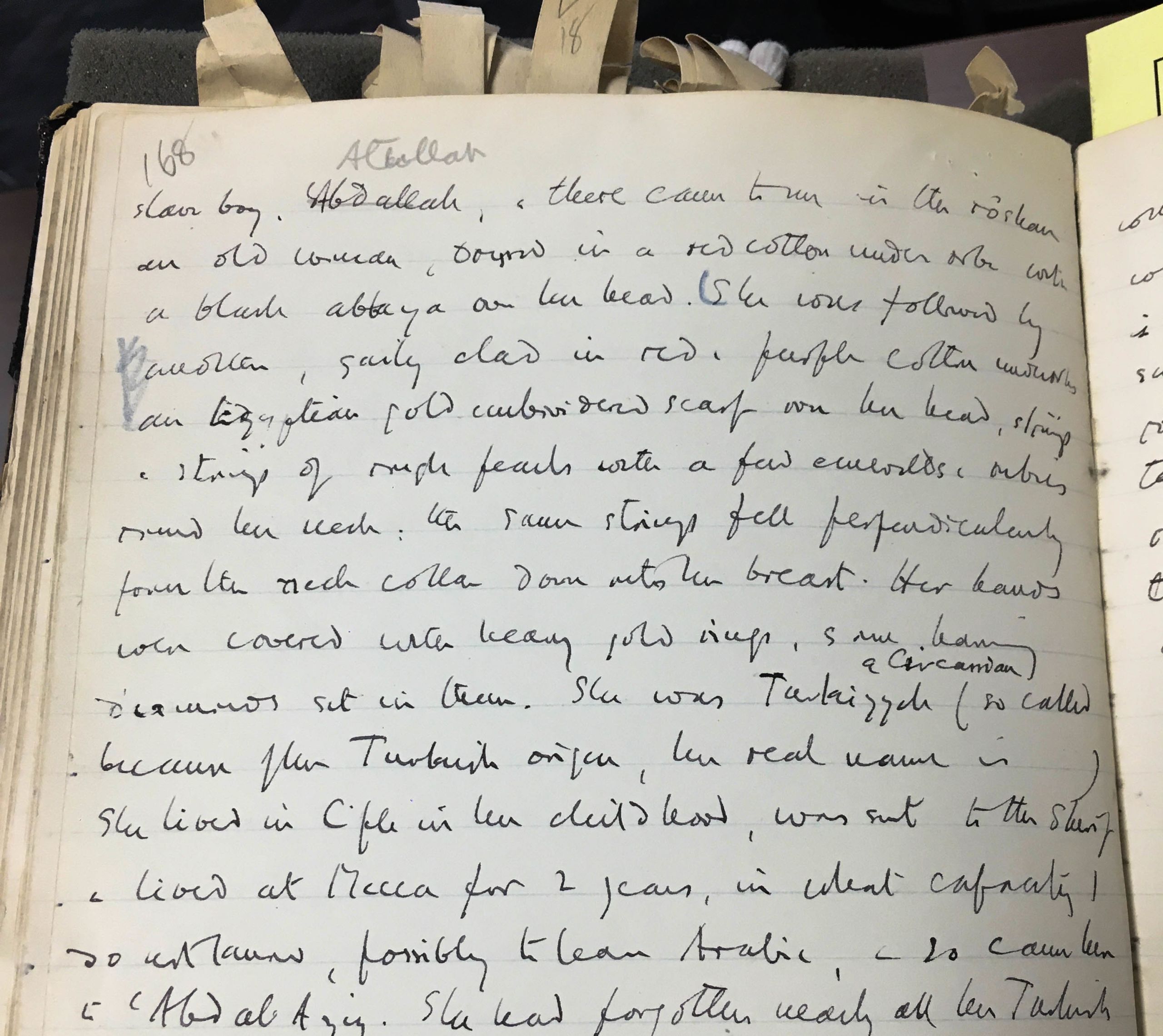
Diary entry introducing Turkiyyeh, 25/2/1914. (February 1914 Diary, Bell (Gertrude Collection, Newcastle University Special Collections.)
Diary entry introducing Turkiyyeh, 25/2/1914. (February 1914 Diary, Bell (Gertrude Collection, Newcastle University Special Collections.)
Another diary entry stated that "All the women are closely veiled here". It is unclear whether "veiled" refers to their garments or their demeanor, however Bell was able to use the privilege of her sex to unveil Turkiyyeh in both senses of the word. Bell uncovered a talkative side to the otherwise reticent wife, no doubt being able to draw upon her experience as a woman at university in order to relate to the oppressive conditions that Turkiyyeh was living in. Turkiyyeh also removed the physical veil of the hijab for Bell's photographs; an exposure of the body that was only permitted to be seen by women and Turkiyyeh's husband.
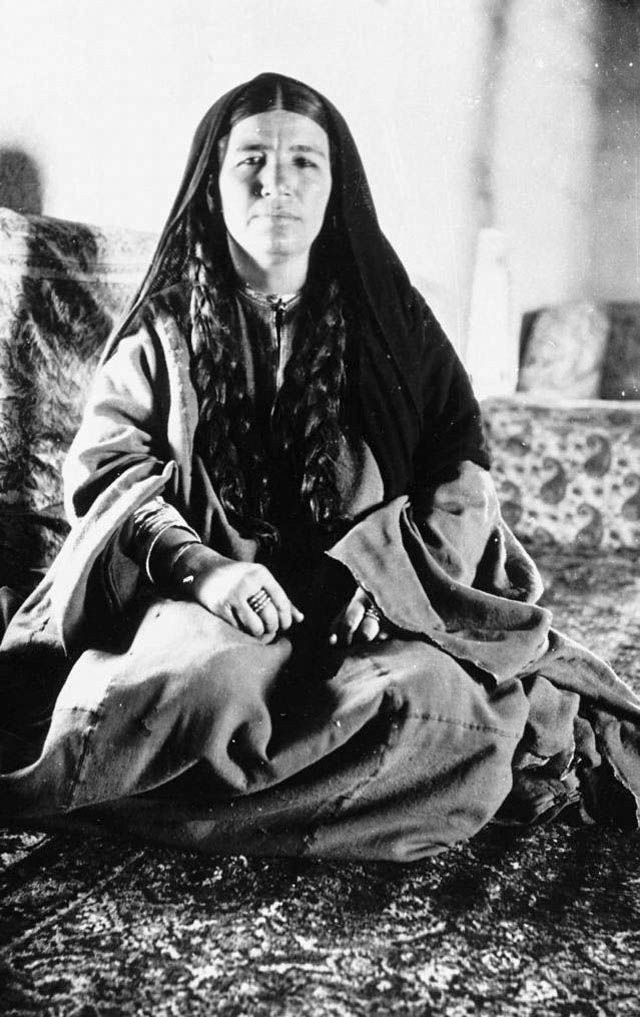
A Circassian named Turkiyyeh, Ha'il, Saudi Arabia, 1914. (X_058, Bell (Gertrude) Collection, Newcastle University Specials Collections)
A Circassian named Turkiyyeh, Ha'il, Saudi Arabia, 1914. (X_058, Bell (Gertrude) Collection, Newcastle University Specials Collections)
Although less frequently documented, Bell did take an interest in female subjects, however she only chose women with lives far removed from her own. The power of Bell's class and knowledge gave her the privilege to use her own gender as a tool. She took interest in Turkiyyeh's experience as a Muslim woman, using womanhood as an advantage in her exploration. Being female allowed Bell to reveal parts of Turkiyyeh that her male colleagues would never have been able to access.
From a twenty-first century perspective, Bell takes on the power of the Imperial gaze by actively framing her photographs in such an exposing manner. The imbalanced power dynamic between Bell and Turkieyyeh puts Bell into the position of the coloniser and Turkiyyeh the colonised subject. Bell occupied a position of exceptionalism by using her unique privilege to embrace or reject gender roles for the purpose of her work.
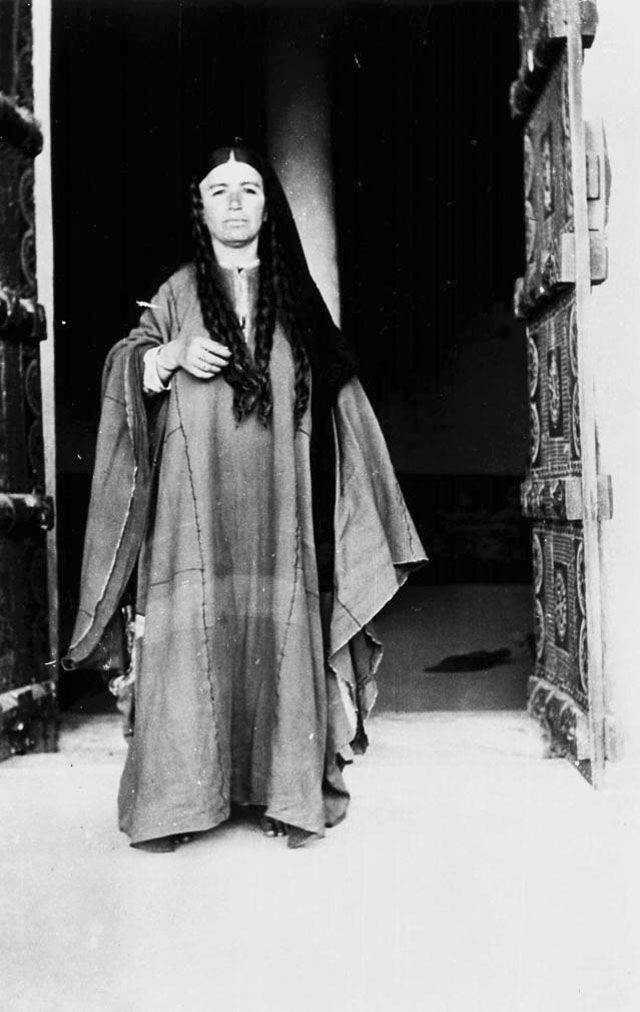
"Political activity will tend to take away woman from her proper sphere and highest duty, which is maternity"
Lord Curzon's 'Fifteen Reasons Against the Grant of Female Suffrage'
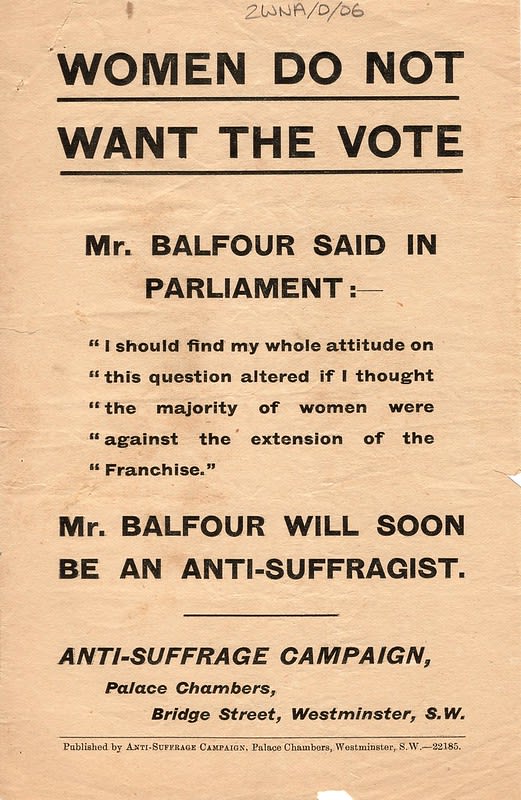
OPPOSING WOMEN'S SUFFRAGE
The rise in women demanding the right to vote in the early Twentieth Century invited heavy opposition. In 1908, the Women's National Anti-Suffrage League was established, and a year later in 1909 a similar group was formed by men: the Men's League for Opposing Women's Suffrage. The men's and women's groups merged in 1910 in the hope that joining forces would strengthen their efforts. They were fighting against legislation being passed that would give women the right to vote. Much of their argument had a heavy emphasis on British Imperialism.
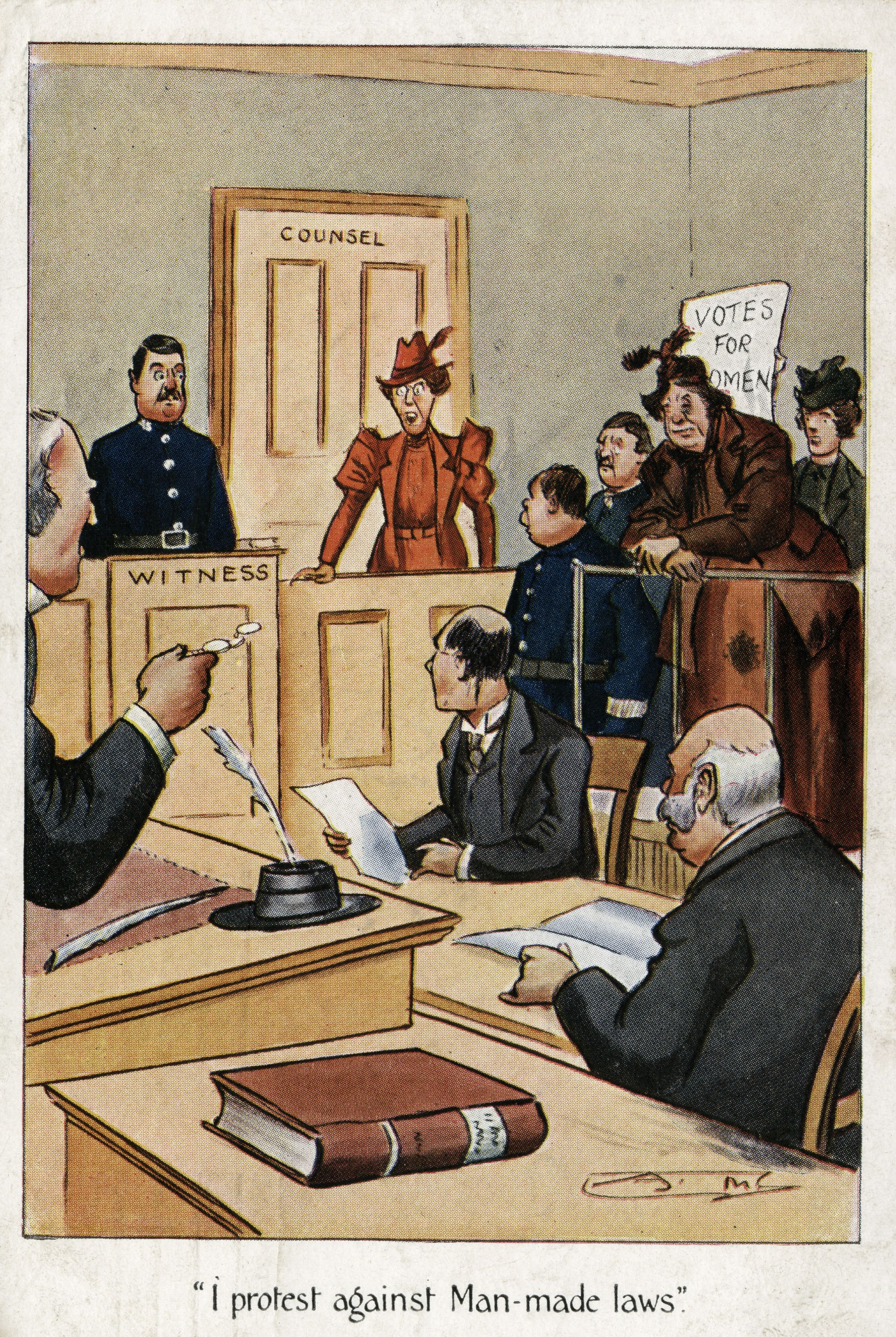
Anti-Suffrage Postcard. Date unknown.
Anti-Suffrage Postcard. Date unknown.
Regardless of class, women were expected to aspire to motherhood and domesticity. Female suffragists frequently remained unmarried; rejecting marriage did not fulfil the role of a woman. Society worried that the social order would be subverted if women transgressed from their assigned gender roles. Imperialists were concerned that undermining the patriarchy would emasculate Britain as a nation, weakening their political stance.
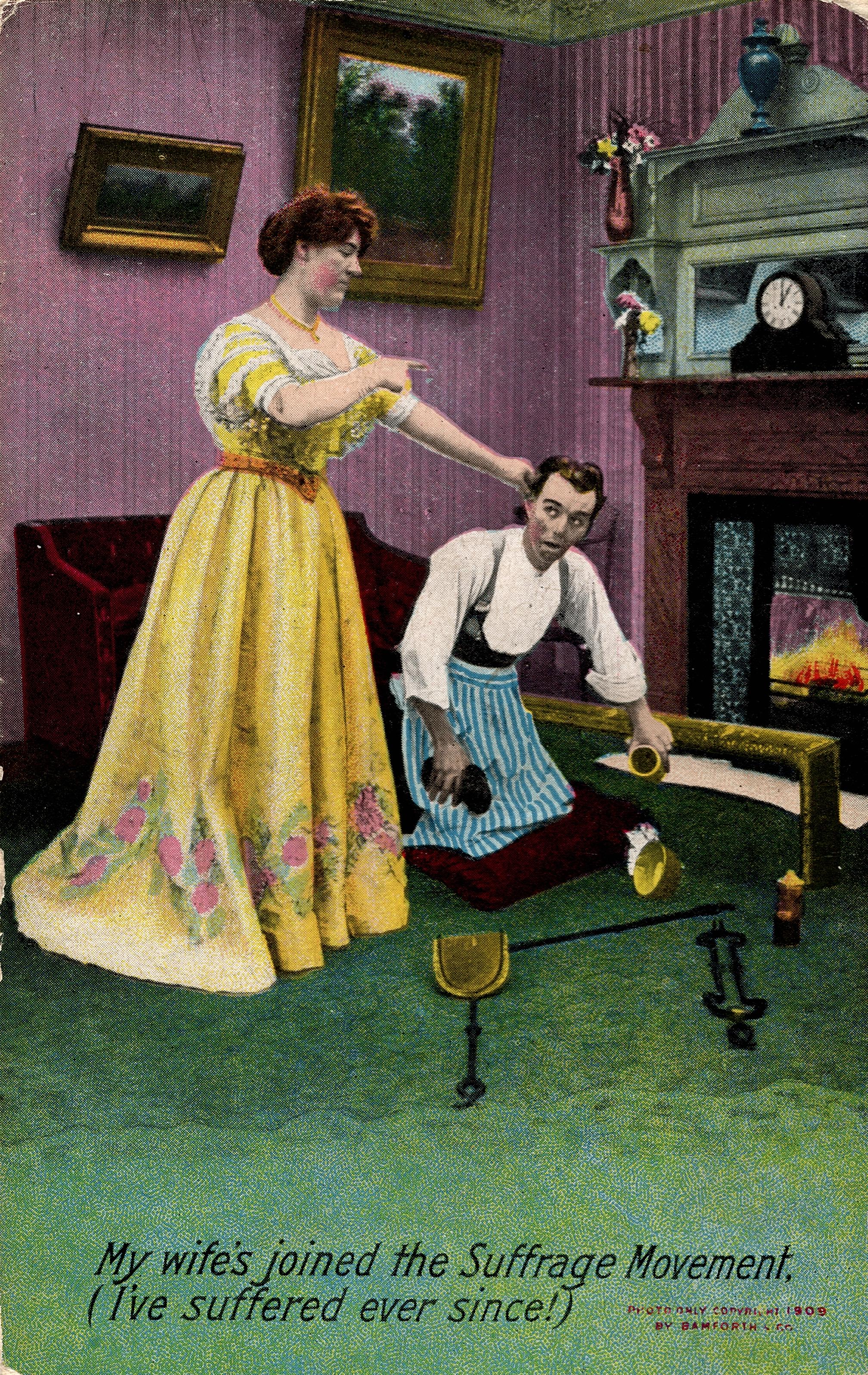
Anti-Suffrage Postcard. 1909.
Anti-Suffrage Postcard. 1909.
The Men's National Anti-Suffrage League cited the concerns of the league's President, Lord Cromer, who outlined his issues with suffrage in a pamphlet entitled 'Lord Cromer's View Against Women's Suffrage'. As the British Consul-General for Egypt, his views were largely related to the disruptive impact that votes for women might have on the formidable growth of the British Empire.
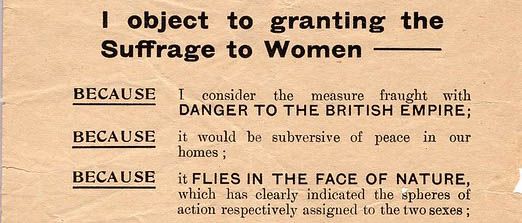
Lord Cromer's View Against Women's Suffrage, Anti-Suffrage Campaign Pamphlet. Cropped.
Lord Cromer's View Against Women's Suffrage, Anti-Suffrage Campaign Pamphlet. Cropped.
Lord Curzon, who had served as Viceroy of India 1899-1905, wrote a pamphlet expressing 'Fifteen Good Reasons Against the Grant of Votes for Women'. He too included a mix of apprehension for the progression of the Empire along with overt misogyny. He stated that women by nature have not "the calmness of temperament or the balance of mind" (4) for exercising a political voice. With female figures like Bell emerging in his social circles, who had both a "calmness of temperament" and a strong political presence, one has to question why he made such damaging generalisations.

Lord Curzon's 'Fifteen Good Reasons Against the Grant of Votes for Women', 1912. Cropped to Reason 4.
Lord Curzon's 'Fifteen Good Reasons Against the Grant of Votes for Women', 1912. Cropped to Reason 4.
The merger to form the National Anti-Suffrage League provoked conflict between the sexes. The women occupied a position which was more progressive in its ideals. They argued that women were equal to men but their strength lay in a different social sphere. The men, on the other hand, were reluctant to be so contemporary in their thought, and sustained the patriarchal rhetoric that men were more politically capable.
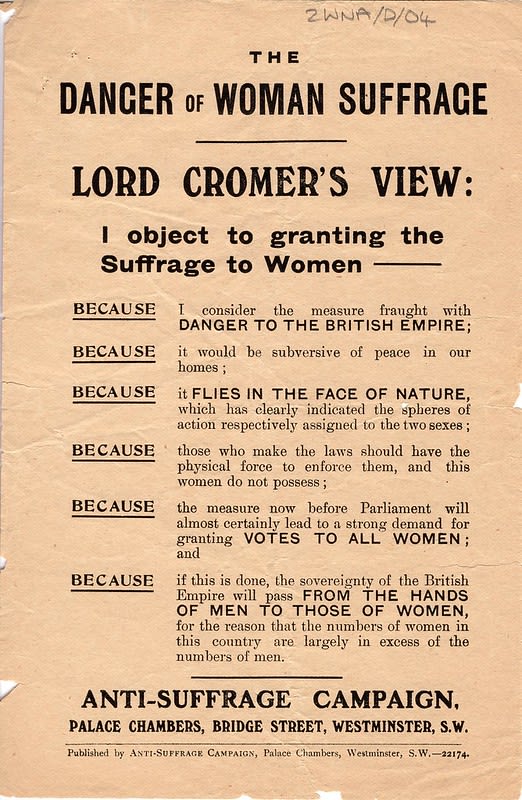
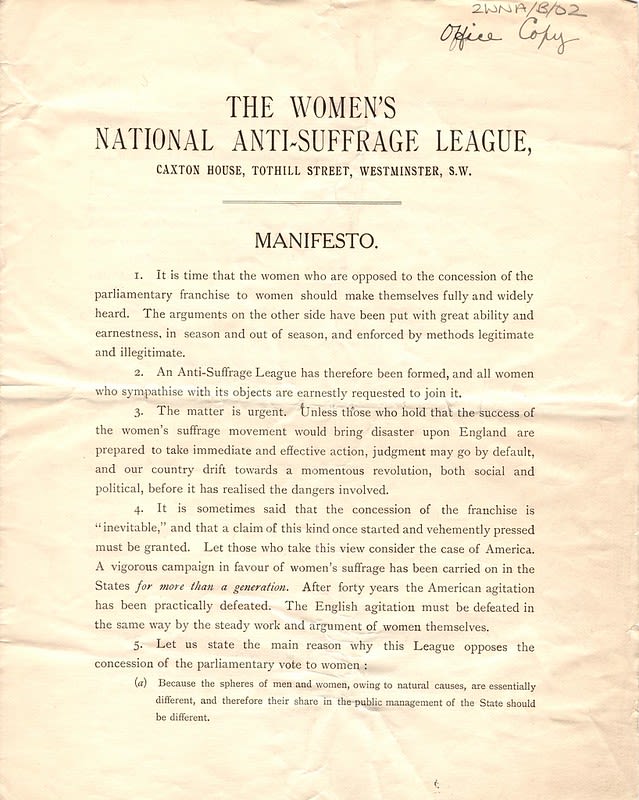
Women's National Anti-Suffrage League Manifesto, first page. 1910.
Women's National Anti-Suffrage League Manifesto, first page. 1910.
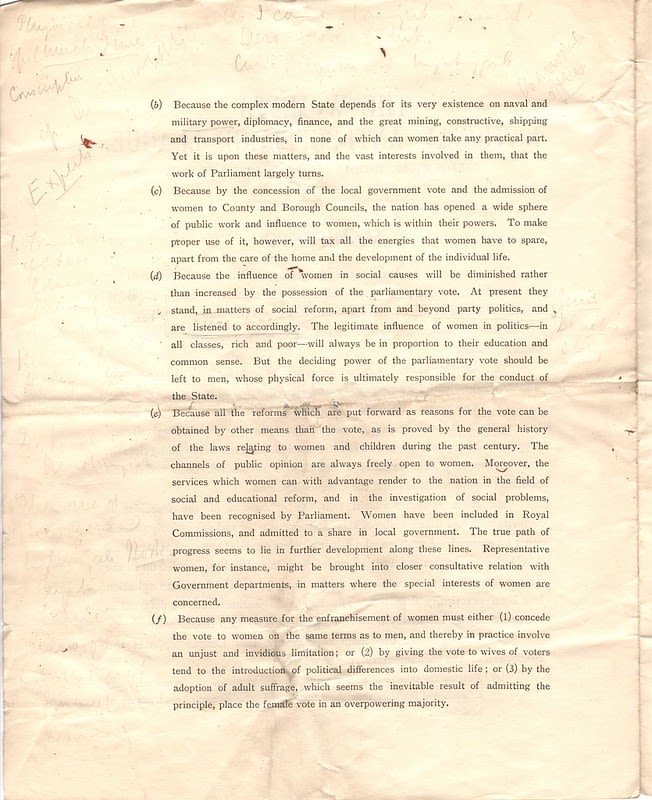
Women's National Anti-Suffrage League Manifesto, second page. 1910.
Women's National Anti-Suffrage League Manifesto, second page. 1910.
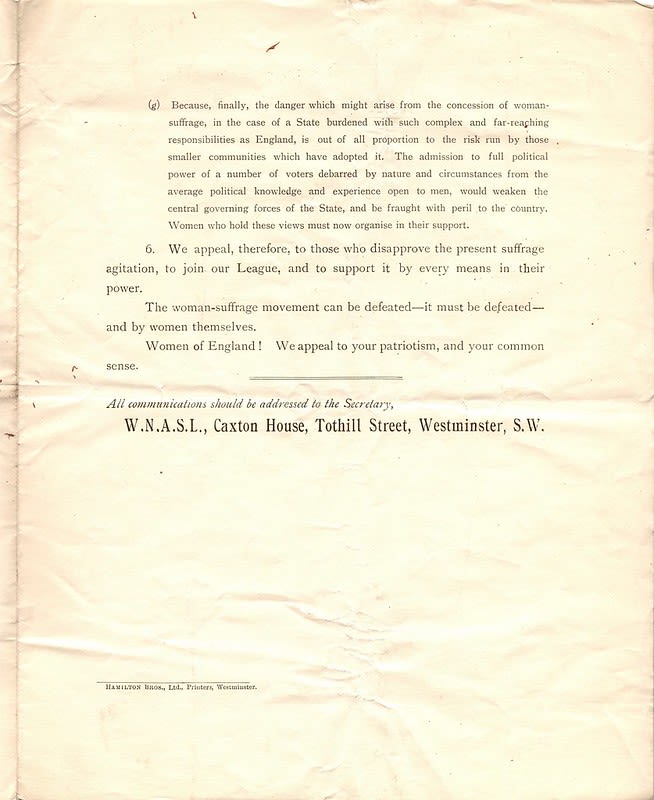
Women's National Anti-Suffrage League Manifesto, third page. 1910.
Women's National Anti-Suffrage League Manifesto, third page. 1910.
THE WOMEN'S NATIONAL ANTI-SUFFRAGE LEAGUE
The Women's National Anti-Suffrage League (WNASL) was formed in response to the expression of the female desire for a political voice. A surprisingly large group of women adamantly dismissed votes for women, and sided with the anti-suffragists. The WNASL's position acknowledged that men and women were equal in purpose but destined to fulfill a different role. Women's strengths supposedly lay in morality and emotional sensitivity. These qualities would have been threatened by immersion into the ruthless world of parliamentary politics, anti-suffragists argued.
Gertrude Bell was made the first Honorary Secretary of the WNASL, and also founded the group's Northern branch. Although occupying positions of power in the anti-suffrage movement, Bell never seemed to be particularly involved. Her letters and diaries mention very little about her participation, and even less about her thoughts on suffrage. Letters from 1907-1910, the time when the anti-suffragists were most prominent, were sent from locations all over Arabia. She was not in the country for the majority of the Anti-Suffrage League's campaigning.
"I have been obliged to become honorary secretary which is most horrible." Bell's letter to Dame Florence, October 1908
In 1912, Mary Ward, Bell's friend from London, founded the Local Government Advancement Committee. The committee promoted the value of women in local rather than national government where their gentle, nurturing temperament was most suited. Bell supported the group during her brief intervals in England.
It seems hypocritical that an independent woman like Bell who remained unmarried for the entirety of her life, and spent the majority of it engaging in political affairs around the globe, was in support of the WNASL. She occupied the position of the transgressive female that anti-suffragists were so opposed to, thus her individual activities conflicted with her own anti-suffrage beliefs. Imperialist Bell was so passionate about the power of the British Empire that she would do anthing to prevent its demise. Since she was an important voice in politics anyway, she most likely recognised that the legal right to vote in parliament would not have altered her life significantly.
Bell separated British parliamentary politics from the politics that she encountered on her travels. She accepted the position of Secretary of Iraq and was fundamental in discussions which defined the state's borders, military system and finance. Her failure to connect the two aspects of politics, and acknowledge that British women had less privilege than herself, ultimately caused her to inflict oppression upon her own sex. An oppression that she too would have suffered if it were not for her individual drive assisted by family wealth. Bell operated outside of all social rules for women, drawing upon any of the privileges that she had the fortune of being able to access. Ultimately, this gave her remarkable power.
Contemporary society now views Bell's life as being in conflict with itself. Feminist and postcolonial theorist Laura E. Donaldson, author of Decolonizing Feminisms: Race, Gender & Empire-Building, believes that it is necessary to abandon "the idea of women's (and men's) gender identity as fixed and coherent" (5), a.k.a women are not monolithic. With individualism varying so much within gender, it is vital to recognise the personal privilege that one has. Bell had the opportunity to elevate other women into the world of politics, but instead only advanced her own prospects. Gertrude Bell's exceptional achievements must be celebrated, but we must also appreciate that in the twenty-first century, the power of women should be elevated rather than diminished.
TO FIND OUT MORE...
ARCHIVAL SOURCES
Bell (Gertrude) Archive. Robinson Library, Newcastle University, Newcastle upon Tyne, http://www.gerty.ncl.ac.uk.
Lady Margaret Hall Archive, Lady Margaret Hall, Oxford University, Oxford.
Records of the Women's National Anti-Suffrage League, The Women's Library, London School of Economics and Political Science.
SECONDARY SOURCES
Bell, Gertrude. Gertrude Bell: The Arabian Diaries, 1913–1914. edited by Rosemary O'Brien. 2000.
Bell, Gertrude. Amurath to Amurath. Cambridge University Press, 2014.
Berry, Helen. "Gertrude Bell: Pioneer, Anti-Suffragist, Feminist Icon?"Gertrude Bell and Iraq: A Life and Legacy, edited by Paul Collins and Charles Tripp, The British Academy by Oxford University Press, 2017.
Bush, Julia. Women Against the Vote: Female Anti-Suffragism in Britain. Oxford University Press, 2007.
Donaldson, Laura E. Decolonizing Feminisms: Race, Gender & Empire-Building. Routledge, 1993.
Garrett Fawcett, Millicent. Women’s Suffrage: A Short History of a Great Movement. 1912. New York Source Book Press, 1970.
Harrison, Brian. Separate Spheres: The Opposition to Women's Suffrage in Britain. Routledge, 2013.
Howell, Georgina. Daughter of the Desert: The Remarkable Life of Gertrude Bell. Pan Macmillan, 2007.
Monroe, Elizabeth. "Gertrude Bell (1868-1926)." Bulletin (British Society for Middle Eastern Studies), 1980. Vol. 7, No. 1, pp. 3-23.